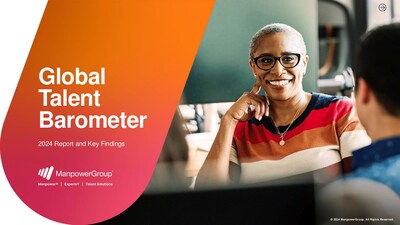ManpowerGroup's Inaugural Global Talent Barometer Reveals Workplace Paradox: 80% Find Meaning at Work, Yet 1 in 3 Eye the Exit
ManpowerGroup's Global Talent Barometer reveals a complex workplace paradox across 16 countries, with an overall score of 67%. The study, covering 12,000 workers, shows that while 80% find meaning in their work, 35% consider changing jobs within six months. The barometer measures three key indices: Well-Being (64%), Job Satisfaction (63%), and Confidence (74%).
Key findings highlight that 49% of employees face daily stress, and those with less stress are twice as likely to stay in their roles. While 71% feel connected to their organization's values, only 65% report adequate work-life balance. Notably, 87% feel confident in their skills, but 34% see growth opportunities. Regional variations show Mexico leading in work meaning (89%), while The Netherlands tops workforce well-being (73%).
Il Barometro Globale delle Competenze di ManpowerGroup rivela un complesso paradosso lavorativo in 16 paesi, con un punteggio complessivo del 67%. Lo studio, che coinvolge 12.000 lavoratori, mostra che mentre l'80% trova significato nel proprio lavoro, il 35% prende in considerazione un cambio di lavoro entro sei mesi. Il barometro misura tre indici chiave: Benessere (64%), Soddisfazione lavorativa (63%) e Fiducia (74%).
I risultati chiave evidenziano che il 49% dei dipendenti affronta stress quotidiano e quelli con meno stress hanno il doppio delle probabilità di rimanere nel proprio ruolo. Sebbene il 71% si senta connesso ai valori della propria organizzazione, solo il 65% riporta un adeguato equilibrio tra vita lavorativa e vita privata. In particolare, l'87% si sente sicuro delle proprie competenze, ma il 34% vede opportunità di crescita. Le variazioni regionali mostrano che il Messico è in testa nel significato del lavoro (89%), mentre i Paesi Bassi si posizionano al primo posto nel benessere dei lavoratori (73%).
El Barómetro Global de Talento de ManpowerGroup revela una compleja paradoja en el lugar de trabajo en 16 países, con una puntuación general del 67%. El estudio, que abarca a 12,000 trabajadores, muestra que mientras el 80% encuentra significado en su trabajo, el 35% considera cambiar de empleo en los próximos seis meses. El barómetro mide tres índices clave: Bienestar (64%), Satisfacción laboral (63%) y Confianza (74%).
Los hallazgos clave destacan que el 49% de los empleados enfrenta estrés diario, y aquellos con menos estrés tienen el doble de probabilidad de quedarse en sus puestos. Aunque el 71% se siente conectado a los valores de su organización, solo el 65% reporta un equilibrio adecuado entre trabajo y vida personal. Notablemente, el 87% se siente seguro en sus habilidades, pero el 34% percibe oportunidades de crecimiento. Las variaciones regionales muestran que México es líder en significado del trabajo (89%), mientras que los Países Bajos encabezan el bienestar laboral (73%).
맨파워그룹의 글로벌 인재 지표는 16개 국가에서 복잡한 직장 패러독스를 드러내며, 전체 점수는 67%입니다. 이 연구는 12,000명의 근로자를 대상으로 하였으며, 80%가 자신의 일에 의미를 찾고 있지만 35%는 6개월 이내에 직업을 변경할 것을 고려하고 있음을 보여줍니다. 이 지표는 세 가지 주요 지수를 측정합니다: 웰빙 (64%), 직무 만족도 (63%), 그리고 자신감 (74%)입니다.
주요 결과는 49%의 직원이 매일 스트레스를 겪고 있으며, 스트레스가 적은 직원은 자신의 역할에 계속 남을 가능성이 두 배 높다는 것을 강조합니다. 71%는 조직의 가치에 연결되어 있다고 느끼지만, 단지 65%만이 적절한 일과 삶의 균형을 보고합니다. 주목할 만하게도, 87%는 자신의 기술에 자신감을 느끼지만, 34%는 성장 기회를 보고 있습니다. 지역별 변동을 보면 멕시코가 일의 의미에서 89%로 1위를 차지하며, 네덜란드는 근로자 웰빙에서 73%로 최고의 점수를 기록하고 있습니다.
Le Baromètre Mondial des Talents de ManpowerGroup révèle un paradoxe complexe sur le lieu de travail dans 16 pays, avec un score global de 67 %. L'étude, couvrant 12 000 travailleurs, montre que 80 % trouvent un sens à leur travail, tandis que 35 % envisagent de changer d'emploi dans les six prochains mois. Le baromètre mesure trois indices clés : Bien-être (64 %), Satisfaction au travail (63 %), et Confiance (74 %).
Les résultats clés soulignent que 49 % des employés affrontent un stress quotidien, et ceux avec moins de stress sont deux fois plus susceptibles de rester dans leurs postes. Bien que 71 % se sentent connectés aux valeurs de leur organisation, seulement 65 % rapportent un équilibre adéquat entre vie professionnelle et vie personnelle. Notamment, 87 % se sentent confiants dans leurs compétences, mais 34 % perçoivent des opportunités de croissance. Les variations régionales montrent que le Mexique est en tête pour le sens du travail (89 %), tandis que les Pays-Bas passent en tête du bien-être des travailleurs (73 %).
Der globale Talentbarometer von ManpowerGroup offenbart ein komplexes Arbeitsplatzparadoxon in 16 Ländern mit einer Gesamtbewertung von 67%. Die Studie, die 12.000 Arbeitnehmer umfasst, zeigt, dass 80% Bedeutung in ihrer Arbeit finden, während 35% in den nächsten sechs Monaten einen Jobwechsel in Betracht ziehen. Der Barometer misst drei Schlüsselindizes: Wohlbefinden (64%), Arbeitszufriedenheit (63%) und Vertrauen (74%).
Wesentliche Erkenntnisse heben hervor, dass 49% der Mitarbeiter täglich Stress empfinden und weniger gestresste Angestellte doppelt so wahrscheinlich in ihren Positionen bleiben. Während 71% sich mit den Werten ihrer Organisation verbunden fühlen, berichten nur 65% von einem angemessenen Gleichgewicht zwischen Berufs- und Privatleben. Bemerkenswerterweise fühlen sich 87% in ihren Fähigkeiten sicher, aber 34% sehen Wachstumschancen. Regionale Unterschiede zeigen, dass Mexiko beim Sinn der Arbeit (89%) führend ist, während die Niederlande bei dem Wohlbefinden der Belegschaft (73%) an erster Stelle stehen.
- None.
- None.
"The employee-employer relationship is at a crossroads. People expect work to offer them more. More balance. More options. More humanity. More than just a paycheck," said ManpowerGroup Chief Commercial Officer Becky Frankiewicz. "While
KEY FINDINGS
Well-Being
- Nearly half (
49% ) of all employees grapple with daily stress, highlighting a critical well-being challenge for employers. - People experiencing less daily stress are twice as likely to remain in their current roles, emphasizing the importance of stress management in talent retention strategies.
- Company culture alignment is strong, with
71% of employees feeling connected to their organization's vision and values, yet there's room for improvement in work-life balance, as only65% feel fully supported in this area.
Job Satisfaction
- A significant retention risk looms, with
35% of all workers – and a staggering47% of young professionals – considering a job change within six months, despite63% expressing job satisfaction. - Job security sentiment is relatively high at
71% , but trust in management for career development lags behind at63% , indicating a potential disconnect between employees and leadership. - Despite reporting higher well-being and work-life balance,
41% of remote workers are considering job changes, challenging conventional wisdom about remote work satisfaction.
Confidence
- People overwhelmingly feel capable in their roles, with
87% expressing confidence in their skills. However, a third (34% ) see a ceiling in their current workplace, citing insufficient opportunities for career goal achievement. - Though
73% believe their organization offers chances to gain new skills,59% of workers say they've received no skills training in the past six months and only57% see clear paths for promotion or internal mobility, suggesting a gap between skill development and career advancement. - Two out of every five Gen X women (
42% ) feel they lack opportunities to reach their career goals at their current organization.
REGIONAL HIGHLIGHTS
Mexico stands out with89% of workers finding high levels of meaning and purpose in their work, whileThe Netherlands leads in overall workforce well-being at73% .Singapore's workforce exhibits a unique duality: they show one of the highest likelihoods of changing jobs in the next six months (41% low job satisfaction) while simultaneously expressing the strongest confidence in their current skills to secure new roles (72% ).- Nordic countries
Norway andSweden demonstrate strong job security, with80% and71% of workers respectively feeling secure in their positions for the next six months. However, these nations also face challenges, with fewer perceived opportunities for development and promotion (48% inNorway and53% inSweden ), and lower trust in managers (57% inNorway and57% inSweden ). France records one of the lowest Well-Being Index scores at61% , suggesting significant challenges in work-life balance and job satisfaction.The United States displays robust overall sentiment, achieving a Confidence Index of79% , with73% of workers feeling secure in their jobs over the next six months.
The Global Talent Barometer introduces new metrics, including the Well-Being Index, Job Satisfaction Index, and Confidence Index, providing a holistic view of workforce sentiment globally. These innovative indices offer employers unprecedented tools to measure and understand employee sentiment, enabling more effective strategies for talent management and workplace improvement.
To view the complete results of the 2024 Global Talent Barometer, visit: manpowergroup.com/en/insights/talent-barometer
ABOUT THE GLOBAL TALENT BAROMETER
The ManpowerGroup Global Talent Barometer measures worker well-being, job satisfaction, and confidence. around the world. The Talent Barometer leverages independent survey best-practices and statistically significant samples to create a powerful tool to better understand what workers want globally. The research aims to improve the future of work through deeper understanding of key drivers of workforce sentiment today.
METHODOLOGY
Survey responses were collected from 12,062 workers across 16 countries from April 15 to May 10, 2024. All the data is weighted to match the worker population in each country by gender, age and region, and all countries are weighted to be equal.
COUNTRIES SURVEYED
ABOUT MANPOWERGROUP
ManpowerGroup® (NYSE: MAN), the leading global workforce solutions company, helps organizations transform in a fast-changing world of work by sourcing, assessing, developing, and managing the talent that enables them to win. We develop innovative solutions for hundreds of thousands of organizations every year, providing them with skilled talent while finding meaningful, sustainable employment for millions of people across a wide range of industries and skills. Our expert family of brands – Manpower, Experis, and Talent Solutions – creates substantially more value for candidates and clients across more than 70 countries and territories and has done so for more than 75 years. We are recognized consistently for our diversity – as a best place to work for Women, Inclusion, Equality, and Disability, and in 2024 ManpowerGroup was named one of the World's Most Ethical Companies for the 15th time – all confirming our position as the brand of choice for in-demand talent.
For more information, visit www.manpowergroup.com, or follow us on LinkedIn, X, Facebook, and Instagram.
FORWARD-LOOKING STATEMENTS
This press release contains forward-looking statements, including statements regarding labor demand in certain regions, countries and industries, as well as economic uncertainty. Actual events or results may differ materially from those contained in the forward-looking statements, due to risks, uncertainties and assumptions. These factors include those found in the Company's reports filed with the U.S. Securities and Exchange Commission (SEC), including the information under the heading "Risk Factors" in its Annual Report on Form 10-K for the year ended December 31, 2023, whose information is incorporated herein by reference. ManpowerGroup disclaims any obligation to update any forward-looking or other statements in this release, except as required by law.
![]() View original content to download multimedia:https://www.prnewswire.com/news-releases/manpowergroups-inaugural-global-talent-barometer-reveals-workplace-paradox-80-find-meaning-at-work-yet-1-in-3-eye-the-exit-302302625.html
View original content to download multimedia:https://www.prnewswire.com/news-releases/manpowergroups-inaugural-global-talent-barometer-reveals-workplace-paradox-80-find-meaning-at-work-yet-1-in-3-eye-the-exit-302302625.html
SOURCE ManpowerGroup









